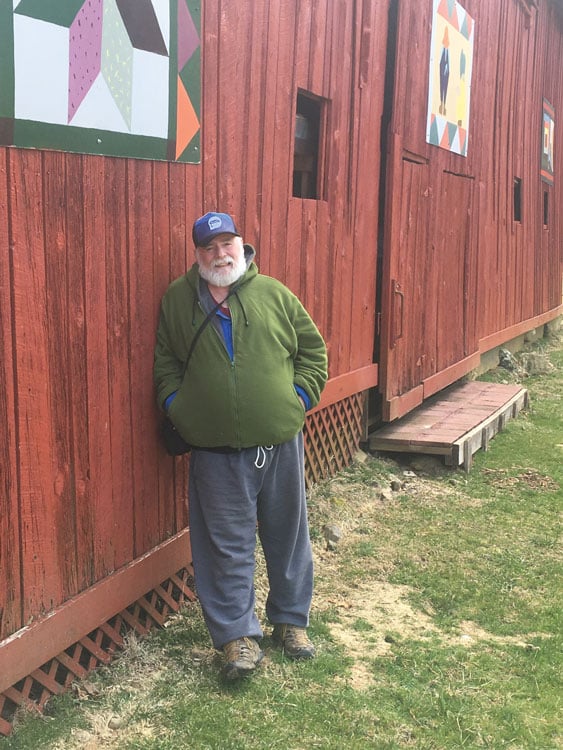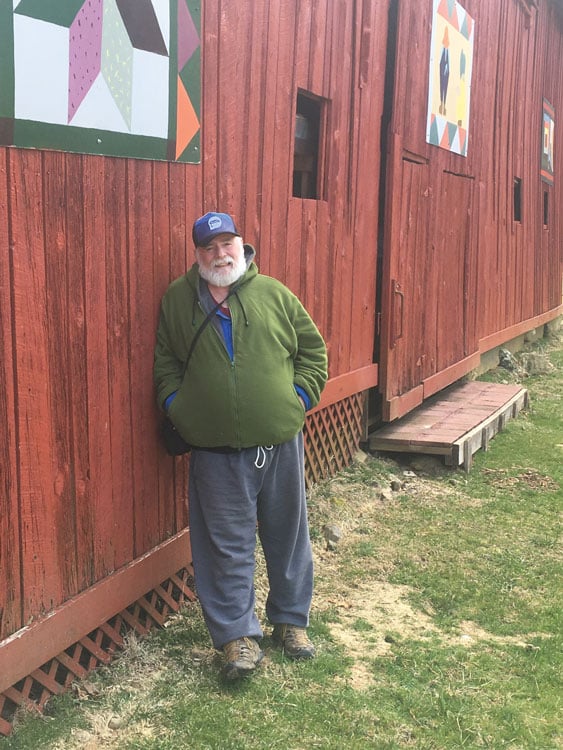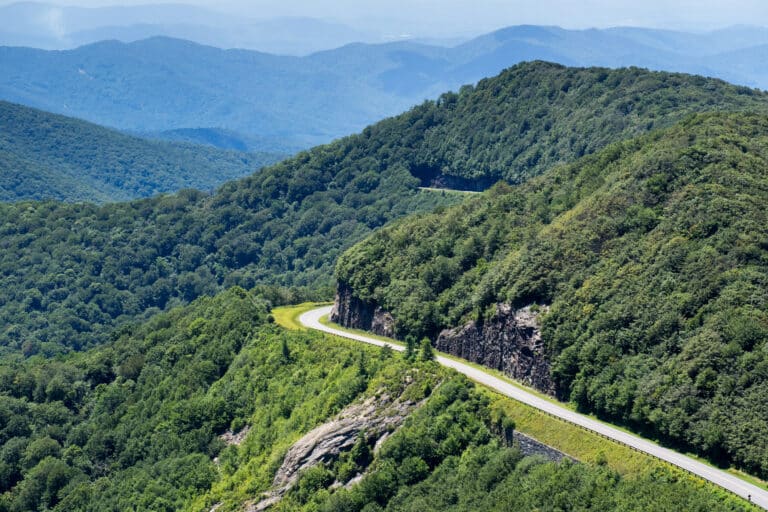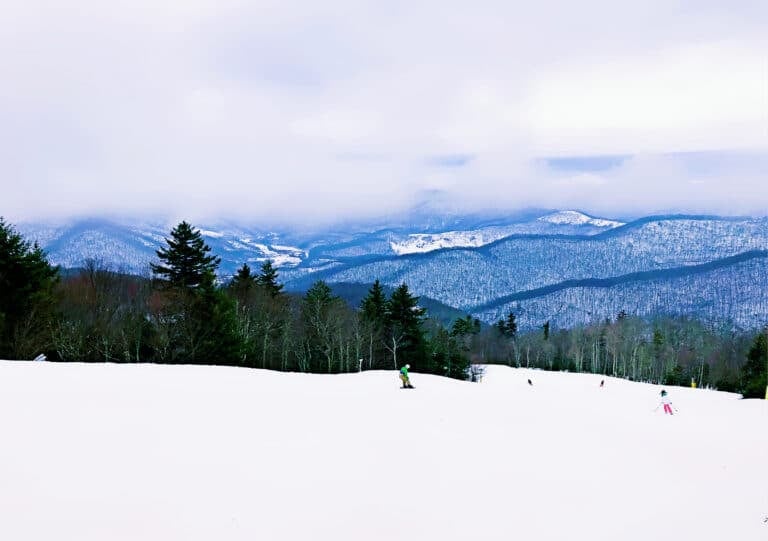
Warren Doyle hangs up his boots after 38,000 miles on the A.T.
Warren Doyle knows how this story should begin.
“A 46-year-old love affair ended last summer,” he says, staring at me across a hardwood table at his folk school in eastern Tennessee, midway between Mountain City and Damascus, Virginia.
Doyle is celebrating the completion of 18 thru-hikes of the Appalachian Trail, but his final 100 miles were the toughest. On his 18th thru-hike last year, Doyle wasn’t sure he could complete the 100-mile section from the White Mountains to Mount Katahdin.
“I’ve never been so nervous about a hike. I’ve hiked over 38,000 miles of trail. All I had was 100 miles left, and I didn’t know whether I could do it or not.”
It turned out he could—you hike with your legs, not your belly, as he says. But the completion marked Doyle’s final thru-hike.
“The thing I believe is noteworthy is that I’m not a trust fund baby,” Doyle says. “I don’t collect benefits. I was a first-generation college student. I traversed the Appalachian Trail 18 times without ever losing a job. I raised two kids and helped put them through college. And that, that demographic is pretty amazing.”
Doyle sunk his life savings into his 5-acre folk school, and that’s where he plans to spend the remainder of his warm seasons. In the winter, he rents leftover timeshares for $7 per night, “living in the lap of luxury in Ocean City, Myrtle Beach, using someone else’s WiFi and TV.”
“I decided to lead a life of practical poverty from age of 60 for the rest of my life,” Doyle says with a grin. “It’s another great adventure.”
Warren Doyle’s 18 thru-hikes of the Appalachian Trail came between between 1969 and 2018. The first set a speed record. Not only did Doyle leave a mark with his own hikes, but he’s also trained a generation of hikers through his Appalachian Trail Institute. Jennifer Pharr-Davis attended the institute before the first of her three (so far) thru-hikes. Doyle called a contra dance at her 2008 wedding, and he played a supporting role in her record-setting 2011 hike.
“Warren spends a lot of time on the emotional and mental preparation,” Pharr-Davis says. “I learned how to think about the trail, and to realize that I would have to be really adaptable but also really stubborn. He talked a lot about reasons why people quit. It’s often that they’re not having fun, or miss someone at home, or the trail is something other than they thought it would be. You go through that very thoroughly, and it helps you anticipate emotional hurdles you’ll encounter on the trail.”
Doyle was just 13 when his 16-year-old sister died of a brain aneurysm. He set out to make up her loss to his parents by becoming an achiever. He became the first of his family to go to college, and the summer after his junior year he won a work scholarship from the American Friends Service Committee, a Quaker peace and social justice organization, to work in a boys orphanage in the mountains of interior Jamaica.
The next year, the Quakers sent him to Don West’s folk school in southern West Virginia. Although Doyle continued college, earning his master’s degree and beginning a Ph.D. program, his time in Jamaica and Appalachia kept gnawing at him.
“I had to do something that no one was telling me to do—no rewards, no cheerleaders, no scholarships, something I wasn’t going to get paid for, or any extrinsic reward,” Doyle says.
So in 1969, at age 23, he set out on his first thru-hike.
“That first hike, I was somewhat naive,” Doyle says. “It was hard. I cried a lot. I had the determination. Thank God I had the temperament. And I was open. I said to the trail, ‘Do what you will with me. I trust everything about you.’ I trust the trail. I trust the mountains. It knows no institutional restraints. It will help you live in harmony with yourself.”
Doyle quickly fell behind his schedule but caught back up in Vermont. By the time he reached Katahdin, he’d set the speed record for the Appalachian Trail.
Upon completing his record-breaking hike, Doyle received a chilly reception from the Appalachian Mountain Club in Connecticut.
“They’d have nothing of me because I walked the trail ‘the wrong way,’” Doyle says. “I didn’t see anything because I walked too fast. I didn’t walk too fast; I walked 15 to 17 hours per day at 2 miles an hour. That’s not walking fast, it’s walking long.”
Doyle persisted in his efforts to give back to the trail by sharing it with others. He started a group that hiked the Connecticut stretch of the trail by tackling it on seven consecutive Sundays in the fall. On a lark, somebody suggested doing all 56 miles in a 24-hour period, and so Doyle led his first expedition of 12 people along the trail. He expanded the idea to the entire trail, leading expeditions of thru-hikers for decades to come.
Through the ‘80s and ‘90s, Doyle raised his children, focused on higher education, and completed two section hikes by knocking out 30 to 35 miles per day over two- to three-week periods every year. He conducted group thru-hike expeditions through the 2000s.
Now, he’s finished with that era of his life.
“I set the terms. It was not imprisonment. I set my own commitment. No one was telling me to do this,” Doyle says. “It’s just a whole different mindset to walk the entire Appalachian Trail. It’s not recreational. Now, I’m just hiking when I feel like it.”
Doyle may be done with thru-hiking, but he’s continuing to run his Appalachian Trail Institute and folk school. And the trail he blazed has made him a legend among the thru-hiking community.
“I think he’s probably up there in the top three or five most important hikers,” says Cindy Ross, a friend of Doyle and triple crown backpacker who has completed the Appalachian Trail, Pacific Crest Trail and the Continental Divide Trail. “There’s a lot of people who know who Warren Doyle is and treat him like a legend. Benton MacKaye and Myron Avery and the people who created the trail are very important, and Earl Shaffer, the first guy to hike the trail. And I think Warren Doyle is right up there with them.”
Pharr-Davis says Doyle’s impact on the trail has evolved over time—as a record setter, for his outspoken opinions, and through his training programs.
“His legacy is very much like the topography of the trail, with ups and downs, highs and lows, and a very real very human journey,” Pharr-Davis says. “The Appalachian Trail has a lot of personalities connected to it throughout its history and its duration, but I think there’s only going to be one Warren Doyle.”








